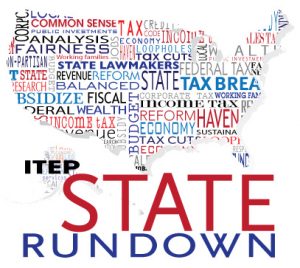 This week, Kansas lawmakers found that they’ll have to roll back Gov. Brownback’s tax cuts and then some to adequately fund state needs. Nebraska legislators took notice of their southern neighbors’ predicament and rejected a major tax cut. Both Hawaii and Montana‘s legislatures sent new state EITCs to their governors, and West Virginia began an uncertain special session as other tax debates also continued around the country.
This week, Kansas lawmakers found that they’ll have to roll back Gov. Brownback’s tax cuts and then some to adequately fund state needs. Nebraska legislators took notice of their southern neighbors’ predicament and rejected a major tax cut. Both Hawaii and Montana‘s legislatures sent new state EITCs to their governors, and West Virginia began an uncertain special session as other tax debates also continued around the country.
— Meg Wiehe, ITEP Deputy Director, @megwiehe
- Efforts to slash taxes in Nebraska using a “trigger” mechanism have been defeated for the year after a bill failed to come close to overcoming a filibuster Tuesday. The bill, favored by Gov. Pete Ricketts and Revenue Committee Chair Jim Smith, would have primarily benefited high-income Nebraskans, worsened the state’s projected budget shortfall, and could have triggered tax cuts in economic hard times. Lawmakers turn to the budget today.
- Back from spring recess, Kansas lawmakers are working to find tax reform solutions that raise enough revenue to close budgetary shortfalls and meet constitutional requirements to adequately fund public education, all while receiving the necessary legislative votes to override a gubernatorial veto.
- Big news out of Hawaii this week: both the Senate and House voted to pass HB 209 yesterday. The bill, which would make permanent the top personal income tax brackets and rates on high-income earners and create a 20 percent nonrefundable Earned Income Tax Credit (EITC), now heads to the governor.
- Under a bipartisan effort, lawmakers in Montana have also passed a bill creating a state Earned Income Tax Credit (EITC) that would be 3 percent of the federal credit (and refundable). The governor is expected to sign the bill.
- Tomorrow marks the first day of West Virginia‘s special session. Yet, uncertainty remains regarding how the divided leadership will come to a budget and tax resolution.
- Despite a tight budget this year and ever present concerns about property taxes in the state, the Texas House has voted to phase out its franchise tax, which is currently one of three major revenue sources in the state. The approved House bill now makes its way to the Senate, which passed a similar elimination bill earlier this session.
- In a renewed effort to shore up funds, a hiring freeze on almost all state agencies went into effect this week in Wyoming. Lawmakers’ opposition to tax increases has left them with limited options for dealing with declining oil prices.
- Florida‘s legislative session is nearly complete. Most of Gov. Rick Scott’s proposed tax cuts have been ignored this year, but the latest package in the House still amounted to nearly $300 million in cuts, and the Senate is expected to approve about $142 million. A bill did pass to send an expansion of the state’s homestead exemption to voters in November 2018, which would cut property taxes and would sap an estimated $750 million of funding for local services that rely on property tax revenue and shift taxes onto businesses.
- A Wisconsin lawmaker is expected to release details soon for a plan that likely proposes to garner more funding for infrastructure investments by raising the gas tax and cutting the income tax through switching to a flat tax structure. Gas tax swaps like this have become increasingly popular, but all suffer from the same problem of boosting infrastructure funding at the expense of core public services like education and public health.
- In Oklahoma, a bill to raise the state’s cigarette and fuel taxes moves forward. If advanced, the bill would increase the cigarette tax rate by $1.50 per pack and the gasoline and diesel fuel by $0.06 per gallon. However, the Senate also passed a bill to reduce road funding in hopes that the fuel tax increase will fill the gap.
- The Seattle City Council has passed a resolution expressing intent to pursue a local income tax. Under a coalition’s proposal, adjusted gross income in excess of $250,000 would be taxed at 1.5 percent. In addition to shoring up the finances of Seattle, the income tax would provide a test legal case for the constitutionality of an income tax in the state of Washington.
- A proposal to tax sugary drinks in Santa Fe, New Mexico failed at the ballot yesterday.
What We’re Reading…
- A new report from the California Budget & Policy Center explains the importance of raising awareness of the state’s Earned Income Tax Credit (EITC). The credit has been available since 2015.
- A new working paper from Columbia University law professor David Schizer explores the benefits of taxing both corporations and their shareholders, though in a coordinated fashion.
If you like what you are seeing in the Rundown (or even if you don’t) please send any feedback or tips for future posts to Meg Wiehe at [email protected]. Click here to sign up to receive the Rundown via email.



